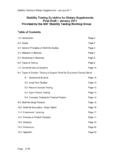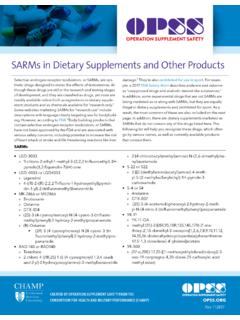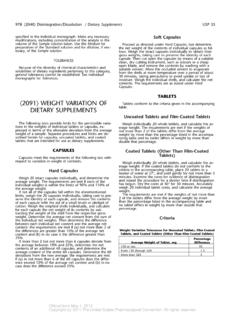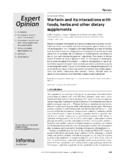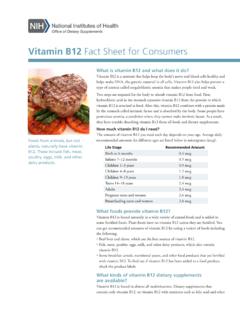Transcription of Part 1 Section 105. - Amounts Received Under …
1 Part 1 Section 105. - Amounts Received Under Accident and Health Plans (Also Section 213. - Medical, Dental, etc., Expenses) Rev. Rul. 2003-102 ISSUE Are reimbursements by an employer of Amounts paid by an employee for medicines, drugs, or dietary supplements purchased by the employee without a physician's prescription excludable from gross income Under 105(b) of the Internal Revenue Code? FACTS Employer N sponsors a health flexible spending arrangement (health FSA). The health FSA provides for the reimbursement of participating employees' medical care expenses that are not covered by other insurance. Employee A is a participating employee in Employer N's health FSA. Employee A purchases an antacid, an allergy medicine, a pain reliever, and a cold medicine from a pharmacy, none of which are purchased with a physician's prescription. Employee A purchases these items for personal use, or for the use of Employee A's spouse or dependents, to alleviate or treat personal injuries or sickness.
2 Employee A also purchases dietary supplements ( , vitamins) without a physician's prescription to maintain the general health of Employee A, or Employee A's spouse or dependents. Employee A submits substantiated claims for all of these expenses, which have been incurred during the current plan year, to Employer N's health FSA for reimbursement. Employee A is not compensated for these expenses by insurance or otherwise. LAW AND ANALYSIS Section 61(a)(1) provides that, except as otherwise provided in subtitle A, gross income includes compensation for services, including fees, commissions, fringe benefits, and similar items. Section 105(a) provides that Amounts Received by an employee through accident or health insurance for personal injuries or sickness are included in gross income to the extent such Amounts (1) are attributable to contributions by the employer that were not includible in the gross income of the employee or (2) are paid by the employer.
3 2 However, 105(b) provides an exception to the general rule requiring inclusion in income. Section 105(b) provides that, except in the case of Amounts attributable to (and not in excess of) deductions allowed Under 213 (relating to medical expenses) for any prior taxable year, gross income does not include Amounts paid, directly or indirectly, to the taxpayer to reimburse the taxpayer for expenses incurred by the taxpayer for the medical care (as defined in 213(d)) of the taxpayer or the taxpayer's spouse or dependents (as defined in 152). Section 105(e) states that Amounts Received Under an accident or health plan for employees are treated as Amounts Received through accident or health insurance for purposes of 105. Section (a) of the Income Tax Regulations provides that an accident or health plan is an arrangement for the payment of Amounts to employees in the event of personal injuries or sickness.
4 Section 213(d)(1) defines "medical care" to include Amounts paid for the diagnosis, cure, mitigation, treatment, or prevention of disease, or for the purpose of affecting any structure or function of the body. Section (e)(1)(ii) states that an expenditure that is merely beneficial to the general health of an individual, such as an expenditure for a vacation, is not an expenditure for medical care. Section (e)(1)(ii) also states that expenditures for "medicines and drugs" are expenditures for medical care. Section (e)(2) states that the term "medicine and drugs" includes only items that are legally procured and generally accepted as falling within the category of medicine and drugs. Section (e)(2) further provides that toiletries ( , toothpaste), cosmetics ( , face creams) and sundry items are not "medicines and drugs" and that Amounts expended for these items are not expenditures for "medical care.
5 " Rev. Rul. 2003-58, 2003-22 959, considers whether Amounts paid by an individual for medicines that may be purchased without a prescription of a physician are deductible Under 213. The ruling notes that 213(b) permits an amount paid for a medicine or drug to be taken into account for the purposes of the 213 deduction for medical care expenses only if the medicine or drug is a prescribed drug or insulin. Section 213(d)(3) defines a "prescribed drug" as a drug or biological that requires a prescription of a physician for its use by an individual. The ruling concludes that Amounts paid for medicines or drugs that may be purchased without a prescription of a physician are not taken into account pursuant to 213(b) and are therefore not deductible Under 213. Section 105(b) specifically refers to "expenses incurred by the taxpayer for .. medical care," as defined in 213(d).
6 There is no requirement in 105(b) that the expense be allowed as a deduction for medical care Under 213(a) or 3that only medicines or drugs that require a physician's prescription be taken into account. Accordingly, the amount expended by Employee A to purchase the antacid, allergy medicine, pain reliever, and cold medicine without a physician's prescription is an expenditure for medical care. Employer N's health FSA reimbursement of Employee A's cost for these items is therefore excludable Under 105(b), even though the cost would not have been deductible Under 213(a). However, the dietary supplements ( , the vitamins) are merely beneficial to Employee A or Employee A's spouse or dependents' general good health. Therefore, the cost of the dietary supplements is not an expense for medical care and is not reimbursable or excludable Under 105(b). HOLDING Reimbursements by an employer of Amounts paid by an employee for medicines and drugs purchased by the employee without a physician's prescription are excludable from gross income Under 105(b).
7 However, Amounts paid by an employee for dietary supplements that are merely beneficial to the general health of the employee or the employee's spouse or dependents, are not reimbursable or excludable from gross income Under 105(b). EFFECT ON OTHER REVENUE RULINGS Rev. Rul. 2003-58 is distinguished. DRAFTING INFORMATION The principal author of this revenue ruling is Barbara E. Pie of the Office of Division Counsel/Associated Chief Counsel (Tax Exempt and Government Entities). For further information regarding this revenue ruling, contact Ms. Pie at (202) 622-6080 (not a toll-free call).











